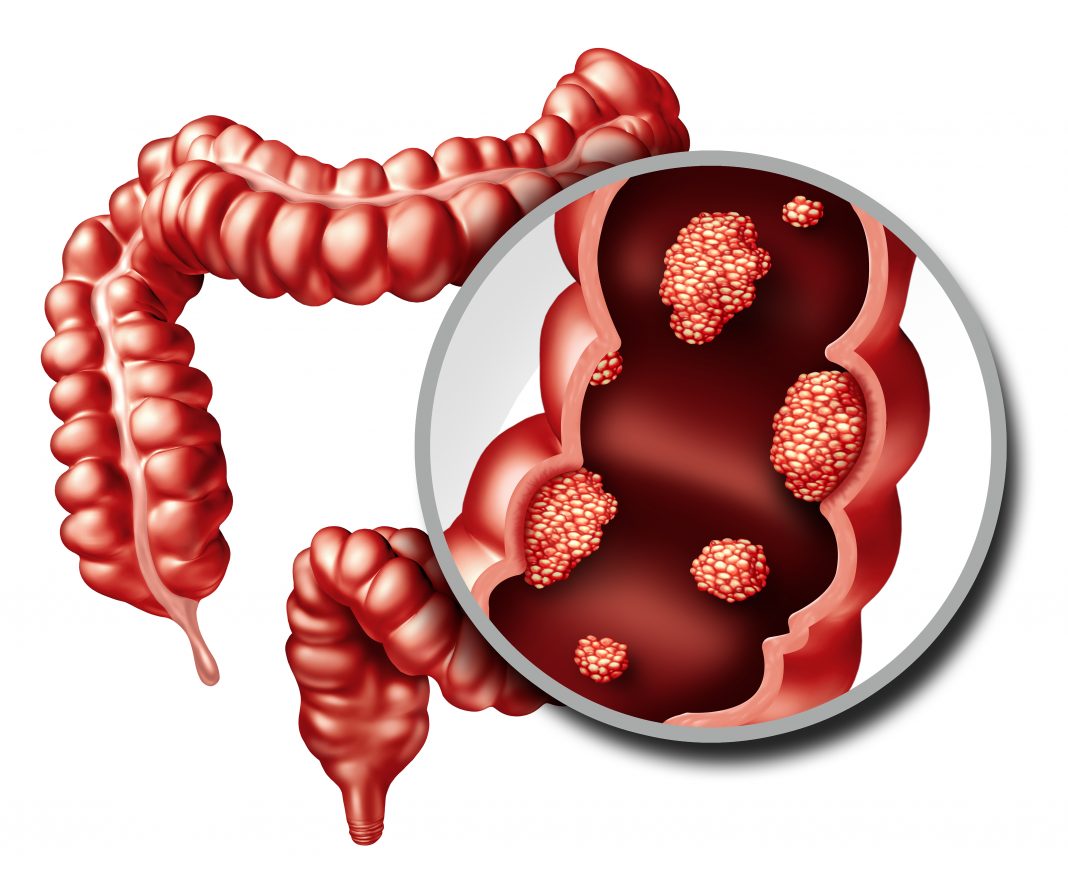University of Massachusetts (UMass) Amherst food scientists have identified a set of metabolic enzymes that are upregulated in colon cancer-bearing mice and in human colon cancer cells, and could represent new therapeutic targets for the disease in humans. Studies headed by Guodong Zhang, PhD, UMass Amherst assistant professor of food science, found that cytochrome P450 (CYP) monooxygenases and their fatty acid metabolites epoxyoctadecenoic (EpOMEs), were increased in colon cancer-bearing mice. Their research showed that blocking CYP monooxygenases in the mouse model held back the progression of colon cancer, while treating animals with a specific CYP monooxygenase metabolite exacerbated tumorigenesis. The results also hinted that overconsumption of foods containing linoleic acids may act to exaggerate inflammation and colon tumor growth.
“Our research identifies a novel therapeutic target and could help to develop novel strategies to reduce the risks of colon cancer,” Zhang commented. The team reported its findings in Cancer Research, in a paper titled, “Targeted metabolomics identifies the cytochrome P450 monooxygenase eicosanoid pathway as a novel therapeutic target of colon tumorigenesis.”

For their reported studies the team used a metabolomics approach to investigate whether colon cancer was exacerbated by CYP monooxygenases and their EpOME fatty acid metabolites. They carried out a comparison of enzyme and metabolite levels in healthy mice and animals with azoxymethane (AOM)/dextran sulfate sodium (DSS)-induced colon cancer, which is a well-established model of the disease. “To our knowledge, a metabolomics-based approach to systematically profile eicosanoids in colon cancer has not been attempted,” they pointed out.
The researchers’ initial analyses showed that of all the metabolites detected, only the CYP monooxygenase-produced eicosanoid metabolites were elevated in both the plasma and the colon of the colon tumor-bearing animals. Additional investigations confirmed that CYP monooxygenase levels were also elevated in the mouse model.
Further analyses demonstrated that CYP monooxygenase gene expression was significantly increased in human colon cancer cells compared with normal colon cells, “which is consistent with the results from animal experiments.”
Follow-on experiments showed that genetically knocking out CYP monooxygenases in the colons of cancer-bearing mice was linked with the development of fewer tumors and lower total tumor burden, in parallel with reduced expression of tumorigenic markers and pro-inflammatory/pro-tumorigenic genes in the colon tumor tissue. Deleting colonic CYP monooxygenases in the experimental mouse model was also associated with reduced colonic concentrations of CYP monooxygenase-produced EpFAs, “supporting the involvement of CYP monooxygenase pathway in colon tumorigenesis.” Pharmacologically blocking CYP monooxygenases similarly led to reduced tumorigenesis, cell proliferation, and pro-inflammatory and pro-tumorigenic genes. “If you block the enzyme, colon cancer can be significantly reduced,” Zhang said.
Next, the team investigated whether specific metabolites might be involved in the colon cancer-enhancing effects of CYP monooxygenases. Their results showed that EpOMEs produced through the CYP monooxygenase metabolism of linoleic acid (which is found in vegetable oils and red meat) were among the most abundant EpFAs in the plasma and tissues, and increased the expression of pro-inflammatory cytokines in human colon cancer cells. Colon cancer-bearing mice treated using linoleic acid-derived 12,13-EpOME also developed greater numbers, and larger tumors than sham-treated cancer-bearing mice.
“Together, our findings demonstrate that the previously unappreciated CYP/EpFA axis is upregulated in colon cancer, contributes to its pathogenesis, and could be therapeutically explored for preventing or treating colon cancer,” the authors concluded. “Using both pharmacological and genetic approaches, our results support that CYP monooxygenases could be a potential therapeutic target of colon cancer.”
The findings in particular highlight a potential role for EpOMEs in exacerbating colon cancer, and suggest that the metabolites might represent novel biomarkers for colon cancer. “Our results support that EpOMEs are critical regulators of colon tumorigenesis,” the team wrote … “12,13-EpOME has direct and potent effects to induce inflammation in vitro, and exacerbate colitis-associated colon tumorigenesis in vivo. A better understanding of the roles of EpOMEs in human colon cancer could help to develop EpOMEs as potential biomarkers of colon cancer, which could have important clinical implications.”
“Based on our findings, overconsumption of linoleic acid could increase tissue concentrations of EpOMEs, which have potent effects to exaggerate inflammation and tumor growth in the colon,” Zhang stated. “We need to better understand this pathway in colon cancer, which ultimately may help us suggest nutritional and therapeutic approaches to reduce the risks of colon cancer.”
The authors acknowledged that further research will be needed to understand the roles of CYP monooxygenases in colon cancer development. Nevertheless, they stated, “these results support that targeting CYP monooxygenases could be a potential strategy to inhibit colon cancer, as well as other types of cancer. Zhang further pointed out that previous studies have shown that some FDA-approved drugs are potent inhibitors of CYP monooxygenases, including drugs for reducing blood pressure, and cholesterol. “That suggests that these drugs could be repurposed for preventing or treating colon cancer,” Zhang added, “and novel monooxygenase inhibitors could be developed for use in humans.”


